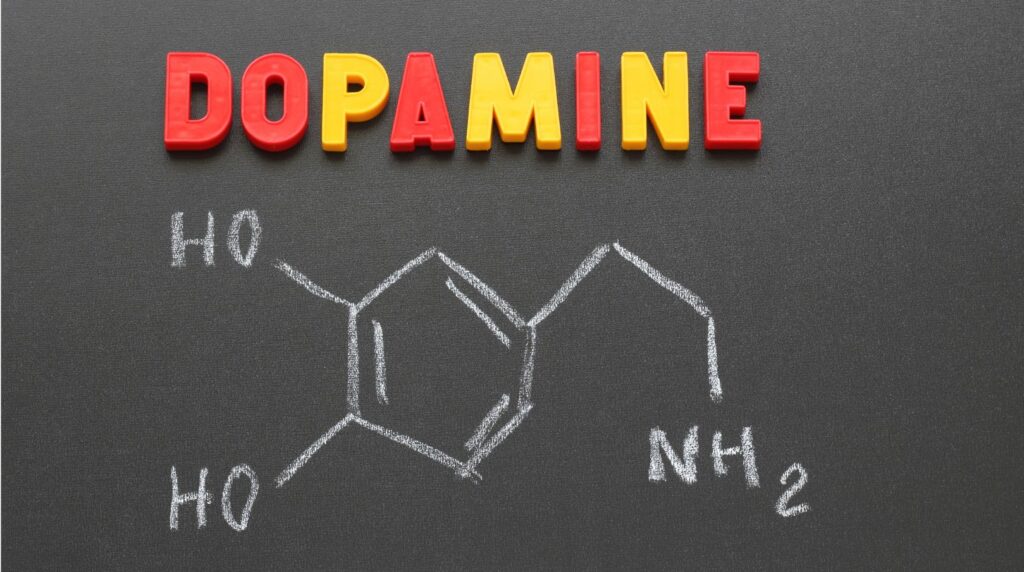ADHD and Dopamine Dysregulation
One prominent hypothesis suggests that ADHD may be linked to a deficiency in dopamine availability or impaired dopamine transmission. Studies using neuroimaging techniques have shown differences in dopamine receptor density and dopamine transporter activity in those with ADHD compared to neurotypical individuals.
This deficiency can result from genetic factors, environmental influences, or a combination of both. The reduced availability of dopamine in the prefrontal cortex may contribute to the difficulties individuals with ADHD face in maintaining sustained attention, inhibiting impulses, and organizing tasks.
Dopamine and Learning
Dopamine plays a crucial role in the brain’s reward and pleasure system, influencing various cognitive functions, including learning. The link between learning and dopamine levels is complex and multifaceted, involving different brain regions and pathways. Here’s an overview of how dopamine contributes to the learning process:
- Reward and Reinforcement – Dopamine is often referred to as the “reward neurotransmitter” because it is released in response to rewarding stimuli. When an individual experiences something positive or reinforcing, such as receiving praise, accomplishing a task, or experiencing pleasure, dopamine is released in certain brain regions.
- Motivation and Goal-Directed Behavior – Dopamine is closely associated with motivation and goal-directed behavior. It helps create a sense of anticipation and drive, encouraging individuals to pursue activities that lead to positive outcomes. This motivational aspect of dopamine is integral to the initiation and persistence of learning-related behaviors.
- Enhancement of Synaptic Plasticity – Synaptic plasticity refers to the ability of neurons to change and adapt in response to experiences. Dopamine, particularly in areas like the hippocampus and prefrontal cortex, enhances synaptic plasticity. This means that the release of dopamine during learning experiences strengthens the connections between neurons, facilitating the formation of new memories and associations.
- Attention and Focus – Dopamine is involved in regulating attention and focus. Optimal dopamine levels in the prefrontal cortex contribute to sustained attention, allowing individuals to concentrate on relevant information during the learning process. Disruptions in dopamine levels may impact attention and hinder effective learning.
- Feedback and Prediction Error – Dopamine is crucial in the brain’s reward prediction system. It plays a role in signaling the difference between expected and actual rewards, known as prediction error. When an individual encounters an unexpected reward or outcome during the learning process, dopamine levels rise, reinforcing the associated learning experience.
- Motor Learning – Dopamine is also involved in motor learning, influencing the acquisition and refinement of motor skills. The basal ganglia, a region rich in dopamine receptors, is particularly important in this regard. Dopamine helps modulate the strength of neural connections related to motor skills, facilitating the learning and execution of various movements.
- Role in Reinforcement Learning – Reinforcement learning involves learning from feedback and adapting behavior based on the consequences of actions. Dopamine is a key player in this process, signaling the positive outcomes and reinforcing behaviors associated with successful learning.
Dopamine is intricately woven into the fabric of the learning process. It motivates individuals to engage in learning-related activities, enhances synaptic plasticity to facilitate memory formation, regulates attention and focus, and plays a vital role in the reinforcement and prediction of learning outcomes. The interplay between dopamine and learning sheds light on how our brain processes information, adapts to experiences, and ultimately acquires new knowledge and skills.
Boosting Dopamine Levels
This is a key reason why boosting dopamine levels in someone with ADHD is a common goal of various treatment strategies. It’s important to note that treatment plans should be individualized, and consulting with a healthcare professional is crucial to determine the most suitable approach. Here are several methods that may help boost dopamine levels in individuals with ADHD:
- Stimulant Medications – Methylphenidate (Ritalin) and Amphetamine (Adderall): These are common stimulant medications prescribed to individuals with ADHD. They work by increasing the release of dopamine and norepinephrine in the brain, leading to improved attention and focus.
- Non-Stimulant Medications – Atomoxetine (Strattera): Unlike stimulants, atomoxetine is a non-stimulant medication that works by increasing the levels of norepinephrine in the brain. While it doesn’t directly affect dopamine, the increase in norepinephrine can indirectly influence dopamine levels.
- Dopamine Precursors – L-Tyrosine and L-Phenylalanine: These are amino acids that serve as precursors to dopamine. Including foods rich in these amino acids in the diet or taking supplements may support the natural synthesis of dopamine.
- Dietary Changes – As dopamine is synthesized from amino acids, incorporating protein-rich foods into the diet can provide the necessary building blocks for dopamine production.
- Exercise – Regular physical activity has been shown to increase dopamine levels in the brain. Engaging in activities such as jogging, swimming, or cycling can be beneficial for individuals with ADHD.
- Adequate Sleep – Poor sleep can negatively impact dopamine levels and worsen ADHD symptoms. Establishing good sleep hygiene practices and ensuring adequate sleep duration is essential.
- Mindfulness and Meditation – Mindfulness meditation and other relaxation techniques have been associated with changes in brain activity, including dopamine regulation. These practices may help manage stress and improve attention.
- Supplements – Some studies suggest that omega-3 fatty acids found in fish oil may have a positive impact on dopamine function. Consultation with a healthcare professional is advised before starting any supplement regimen.
- Limiting Sugar and Processed Foods – Diets high in sugar and processed foods may contribute to fluctuations in blood sugar levels, which can impact dopamine function. A well-balanced diet that includes whole foods is generally recommended.
It’s important for individuals with ADHD to work closely with healthcare professionals to find the most effective and personalized treatment plan. Treatment may involve a combination of different approaches, and periodic adjustments may be necessary to address individual needs and responses. But the rewards of normal dopamine levels can be life changing.
References
- https://www.healthline.com/health/adhd/adhd-dopamine
- https://www.webmd.com/add-adhd/childhood-adhd/adhd-dopamine
- https://www.medicalnewstoday.com/articles/how-to-increase-dopamine-adhd#increasing-dopamine-naturally
- https://www.additudemag.com/slideshows/adhd-obesity-link/
- https://www.verywellhealth.com/dopamine-and-adhd-5220847



